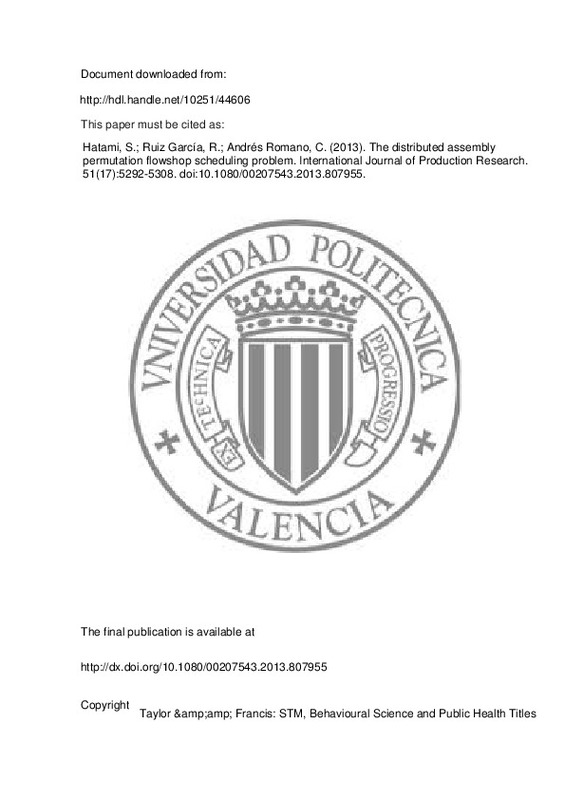Basso, D., Chiarandini, M., & Salmaso, L. (2007). Synchronized permutation tests in replicated designs. Journal of Statistical Planning and Inference, 137(8), 2564-2578. doi:10.1016/j.jspi.2006.04.016
Biggs, D., De Ville, B., & Suen, E. (1991). A method of choosing multiway partitions for classification and decision trees. Journal of Applied Statistics, 18(1), 49-62. doi:10.1080/02664769100000005
Chan, F. T. S., Chung, S. H., Chan, L. Y., Finke, G., & Tiwari, M. K. (2006). Solving distributed FMS scheduling problems subject to maintenance: Genetic algorithms approach. Robotics and Computer-Integrated Manufacturing, 22(5-6), 493-504. doi:10.1016/j.rcim.2005.11.005
[+]
Basso, D., Chiarandini, M., & Salmaso, L. (2007). Synchronized permutation tests in replicated designs. Journal of Statistical Planning and Inference, 137(8), 2564-2578. doi:10.1016/j.jspi.2006.04.016
Biggs, D., De Ville, B., & Suen, E. (1991). A method of choosing multiway partitions for classification and decision trees. Journal of Applied Statistics, 18(1), 49-62. doi:10.1080/02664769100000005
Chan, F. T. S., Chung, S. H., Chan, L. Y., Finke, G., & Tiwari, M. K. (2006). Solving distributed FMS scheduling problems subject to maintenance: Genetic algorithms approach. Robotics and Computer-Integrated Manufacturing, 22(5-6), 493-504. doi:10.1016/j.rcim.2005.11.005
Chan, F. T. S., Chung, S. H., & Chan, P. L. Y. (2006). Application of genetic algorithms with dominant genes in a distributed scheduling problem in flexible manufacturing systems. International Journal of Production Research, 44(3), 523-543. doi:10.1080/00207540500319229
Liao, C.-J., & Liao, L.-M. (2008). Improved MILP models for two-machine flowshop with batch processing machines. Mathematical and Computer Modelling, 48(7-8), 1254-1264. doi:10.1016/j.mcm.2008.01.001
Framinan, J. M., & Leisten, R. (2003). An efficient constructive heuristic for flowtime minimisation in permutation flow shops. Omega, 31(4), 311-317. doi:10.1016/s0305-0483(03)00047-1
Gao, J., & Chen, R. (2011). A hybrid genetic algorithm for the distributed permutation flowshop scheduling problem. International Journal of Computational Intelligence Systems, 4(4), 497-508. doi:10.1080/18756891.2011.9727808
Hansen, P., & Mladenović, N. (2001). Variable neighborhood search: Principles and applications. European Journal of Operational Research, 130(3), 449-467. doi:10.1016/s0377-2217(00)00100-4
Hariri, A. M. A., & Potts, C. N. (1997). A branch and bound algorithm for the two-stage assembly scheduling problem. European Journal of Operational Research, 103(3), 547-556. doi:10.1016/s0377-2217(96)00312-8
Jia, H. Z., Fuh, J. Y. H., Nee, A. Y. C., & Zhang, Y. F. (2002). Web-based Multi-functional Scheduling System for a Distributed Manufacturing Environment. Concurrent Engineering, 10(1), 27-39. doi:10.1177/1063293x02010001054
Jia, H. Z., Nee, A. Y. C., Fuh, J. Y. H., & Zhang, Y. F. (2003). Journal of Intelligent Manufacturing, 14(3/4), 351-362. doi:10.1023/a:1024653810491
Jia, H. Z., Fuh, J. Y. H., Nee, A. Y. C., & Zhang, Y. F. (2007). Integration of genetic algorithm and Gantt chart for job shop scheduling in distributed manufacturing systems. Computers & Industrial Engineering, 53(2), 313-320. doi:10.1016/j.cie.2007.06.024
Kass, G. V. (1980). An Exploratory Technique for Investigating Large Quantities of Categorical Data. Applied Statistics, 29(2), 119. doi:10.2307/2986296
Lee, C.-Y., Cheng, T. C. E., & Lin, B. M. T. (1993). Minimizing the Makespan in the 3-Machine Assembly-Type Flowshop Scheduling Problem. Management Science, 39(5), 616-625. doi:10.1287/mnsc.39.5.616
Morgan, J. N., & Sonquist, J. A. (1963). Problems in the Analysis of Survey Data, and a Proposal. Journal of the American Statistical Association, 58(302), 415-434. doi:10.1080/01621459.1963.10500855
Pan, Q.-K., & Ruiz, R. (2012). Local search methods for the flowshop scheduling problem with flowtime minimization. European Journal of Operational Research, 222(1), 31-43. doi:10.1016/j.ejor.2012.04.034
Potts, C. N., Sevast’janov, S. V., Strusevich, V. A., Van Wassenhove, L. N., & Zwaneveld, C. M. (1995). The Two-Stage Assembly Scheduling Problem: Complexity and Approximation. Operations Research, 43(2), 346-355. doi:10.1287/opre.43.2.346
Ruiz, R., & Stützle, T. (2007). A simple and effective iterated greedy algorithm for the permutation flowshop scheduling problem. European Journal of Operational Research, 177(3), 2033-2049. doi:10.1016/j.ejor.2005.12.009
Ruiz, R., Şerifoğlu, F. S., & Urlings, T. (2008). Modeling realistic hybrid flexible flowshop scheduling problems. Computers & Operations Research, 35(4), 1151-1175. doi:10.1016/j.cor.2006.07.014
Ruiz, R., & Andrés-Romano, C. (2011). Scheduling unrelated parallel machines with resource-assignable sequence-dependent setup times. The International Journal of Advanced Manufacturing Technology, 57(5-8), 777-794. doi:10.1007/s00170-011-3318-2
Stafford, E. F., Tseng, F. T., & Gupta, J. N. D. (2005). Comparative evaluation of MILP flowshop models. Journal of the Operational Research Society, 56(1), 88-101. doi:10.1057/palgrave.jors.2601805
Tozkapan, A., Kırca, Ö., & Chung, C.-S. (2003). A branch and bound algorithm to minimize the total weighted flowtime for the two-stage assembly scheduling problem. Computers & Operations Research, 30(2), 309-320. doi:10.1016/s0305-0548(01)00098-3
Tseng, F. T., & Stafford, E. F. (2008). New MILP models for the permutation flowshop problem. Journal of the Operational Research Society, 59(10), 1373-1386. doi:10.1057/palgrave.jors.2602455
[-]







![[Cerrado]](/themes/UPV/images/candado.png)


